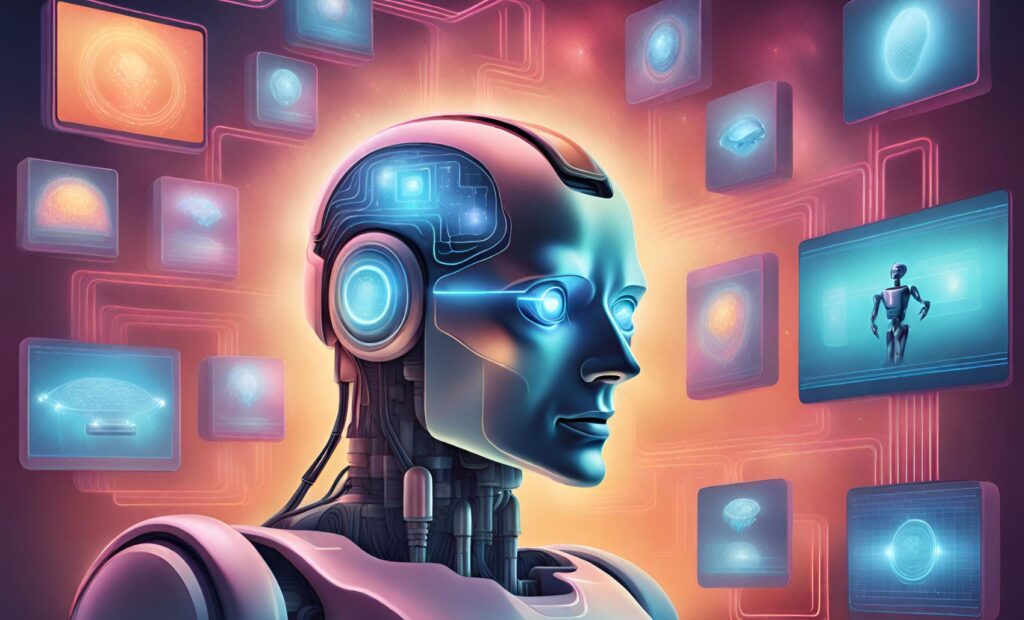Are you interested in exploring the most advanced AI systems currently available? we take you on a captivating journey into the cutting-edge advancements of Artificial Intelligence (AI). From healthcare to finance and entertainment, AI has revolutionized various industries. In this article, we delve into the functionalities and impact of renowned AI technologies like OpenAI’s GPT-4, Google’s DeepMind, and IBM’s Watson. Perfect for AI enthusiasts, tech innovators, researchers, and students, our article aims to bridge the gap between novices and experts, offering insights into AI trends, technology, and breakthroughs. Join us as we uncover the marvels of AI and shed light on the most advanced AI systems reshaping our world today!
Continuing with our mission to bring you the most captivating stories in AI, our newsletter, Waveup’s Weekly AI Dive, provides a wealth of content on AI tools, AI news, and artificial general intelligence (AGI). We’re passionate about simplifying complex concepts and driving discussions on the ethical implications of AI. Whether you’re a tech enthusiast, a professional eager to stay ahead in the AI landscape, or simply curious about the future of AI, Waveup’s Weekly AI Dive is your go-to destination. Subscribe now to expand your knowledge and explore the limitless possibilities of technology and AI.

Winston AI
Introduction to Winston AI
Winston AI is a highly accurate AI-powered detection and plagiarism checker. It is purpose-built for educators, content creators, and publishers. With the use of Optical Character Recognition (OCR) technology, Winston AI can convert digital and handwritten documents into machine-readable formats. It boasts a remarkable 99% accuracy rate in detecting AI-generated content, including outputs from advanced language models like ChatGPT. The best-in-class plagiarism detection tool allows users to confidently ascertain the originality of their work. Additionally, Winston AI offers intuitive document organization features for easy categorization and labeling. Its multi-format upload feature supports the processing of Word and PDF documents, making it suitable for academics and web publishers alike.
Features and Capabilities
Winston AI stands out for its highly accurate detection of AI-generated content, making it an essential tool for content authenticity and plagiarism detection. Its Optical Character Recognition (OCR) technology enables the conversion of both digital and handwritten documents into machine-readable formats. With a 99% accuracy rate, users can trust in its ability to detect AI-generated content and ensure the originality of their work. Furthermore, Winston AI’s intuitive document organization features make it easy to manage and categorize documents, streamlining workflows for educators, content creators, and publishers. The multi-format upload feature expands its usability, allowing users to process both Word and PDF documents seamlessly. Overall, Winston AI combines cutting-edge AI technology with user-friendly features to meet the needs of its diverse user base.
Applications and Impact
Winston AI has a significant impact on various industries and users. In the field of education, Winston AI provides educators with an invaluable tool for ensuring academic integrity and detecting plagiarism in students’ work. This promotes a culture of originality and fosters a fair learning environment. For content creators and publishers, Winston AI is a reliable solution for verifying the authenticity of written content, protecting their intellectual property, and maintaining high-quality standards. By identifying AI-generated content, it helps combat the proliferation of misinformation and ensures that original ideas are acknowledged. Winston AI’s impact extends beyond the individual level, benefiting industries as a whole by upholding integrity and authenticity in educational and publishing settings.
Sophia the Robot
Overview of Sophia the Robot
Sophia the Robot, developed by Hanson Robotics and activated in 2016, represents a significant leap in the field of robotics and artificial intelligence. This humanoid robot has gained recognition for its human-like appearance and behavior, showcasing the advancements made in AI and robotics. Sophia’s design aims to serve multiple purposes, including research, education, and entertainment. By mimicking human-like expressions and engaging in natural interactions, Sophia sparks public discussions about AI ethics and the future of robotics.
Design and Development
Sophia’s design and development rely on state-of-the-art robotics technology and AI algorithms. The team at Hanson Robotics meticulously crafted her appearance and behavior to resemble a human as closely as possible. With a realistic face and expressive features, Sophia can engage with humans in a visually familiar way. Her AI algorithms enable her to process natural language and respond intelligently to questions, making conversations with her feel more human-like. This seamless integration of robotics and AI allows Sophia to interact with humans in a lifelike manner, blurring the lines between humans and machines.
Applications and Uses
Sophia’s advanced capabilities have numerous applications across different industries. In research, Sophia provides a platform for studying human-robot interactions, enabling researchers to uncover insights into the complex dynamics of human communication. The education sector benefits from Sophia’s ability to engage with students, making learning more interactive and captivating. Sophia has also made a significant impact in the entertainment industry, captivating audiences with her lifelike appearance and performances. By showcasing the possibilities of AI and robotics, Sophia is contributing to the broader discussion on the potential uses and ethical implications of these technologies.
Google DeepMind AlphaGo
Introduction to Google DeepMind AlphaGo
Google DeepMind AlphaGo is a groundbreaking AI system that achieved significant advancements in the game of Go. It combines advanced search tree algorithms with deep neural networks to process the game’s description through millions of neuron-like connections. AlphaGo’s learning process began with exposure to numerous amateur games, allowing it to understand reasonable human play. Through self-play and algorithm refinement, it eventually became the world’s best Go player, surpassing even world champions.
Advancements in AI within the Game of Go
AlphaGo’s success in the game of Go demonstrates the power of AI in complex strategical decision-making. By analyzing countless patterns and learning from both human and self-play games, AlphaGo developed innovative strategies and made creative moves that surpassed previous human knowledge. These groundbreaking advancements have not only pushed the boundaries of what AI can achieve in gaming but also opened up possibilities for AI’s application in other strategic domains.
Implications and Future Possibilities
The development of AlphaGo has far-reaching implications beyond the game of Go. The techniques and algorithms employed by AlphaGo can be applied to other complex problem-solving scenarios, such as cybersecurity, financial analysis, and drug discovery. AlphaGo’s success also highlights the potential of AI to assist experts in various fields by providing novel insights and strategies. As AI continues to advance, future possibilities include using similar techniques for developing intelligent systems that can tackle complex challenges in medicine, climate science, and other critical domains.
IBM Watson
Overview of IBM Watson
IBM Watson is a leading AI system renowned for its ability to understand natural language and interact meaningfully with users. It excels in processing unstructured data and comprehending human language nuances, enabling it to navigate vast amounts of diverse data. Watson’s learning capability is iterative, refining its performance with each interaction. As a cloud-based system, Watson can scale to process large volumes of data rapidly, making it a powerful tool across various industries.
Natural Language Processing Capabilities
Watson’s Natural Language Processing (NLP) capabilities are at the core of its success. By understanding and processing human language, Watson can generate and evaluate hypotheses, providing potential solutions ranked by confidence levels. This advanced reasoning ability allows for complex analysis and decision-making based on textual data. Watson’s NLP capabilities enable it to comprehend the intricacies of language and deliver meaningful insights from vast datasets.
Interactions and Applications
One of the notable applications of Watson is its participation in the game show Jeopardy!, where it demonstrated its capacity for human-like engagement and knowledge retrieval. Beyond game shows, Watson’s capabilities are applicable to a wide range of industries, including healthcare, finance, and customer service. In healthcare, Watson can analyze medical records, research papers, and patient data to assist healthcare professionals in making accurate diagnoses and treatment plans. In finance, Watson’s analysis of market trends and news can provide valuable insights for investment decision-making. Watson’s versatility and ability to process unstructured data make it a valuable tool across multiple domains.

Nvidia Deep Learning AI Software
Introduction to Nvidia Deep Learning AI Software
Nvidia Deep Learning AI software is a comprehensive deep learning software stack designed specifically for researchers and developers. It offers a wide range of tools and functionalities that facilitate the construction of high-performance GPU-accelerated applications in various domains, including conversational AI, recommendation systems, and computer vision. Built on the state-of-the-art Nvidia Volta GPU architecture, this software stack ensures optimal performance and delivers cutting-edge capabilities in the field of deep learning.
Comprehensive Features and Functionality
Nvidia Deep Learning AI software incorporates a variety of AI libraries known for their top-tier performance during both training and inference phases. It provides pre-trained models and deep learning software from the Nvidia NGC catalog, which is a hub for GPU-optimized software in the field of deep learning and machine learning. The software also offers seamless integration with major deep learning frameworks such as PyTorch, TensorFlow, and JAX, giving researchers and developers flexibility and ease of use in their projects. Additionally, the Nvidia Deep Learning Institute (DLI) provides hands-on training in AI-accelerated computing and accelerated data science, fostering a robust learning environment for users.
Benefits for Researchers and Developers
Nvidia Deep Learning AI software empowers researchers and developers by providing them with a comprehensive set of tools and resources for their deep learning projects. The software stack’s integration with popular deep learning frameworks simplifies the development process and allows users to leverage the latest advancements in AI research. The inclusion of pre-trained models and GPU-optimized software from the Nvidia NGC catalog saves time and computational resources, enabling users to focus on their specific research objectives or development tasks. The Nvidia DLI’s hands-on training further enhances users’ skills and knowledge, supporting their continuous growth in the rapidly evolving field of deep learning.
Azure Machine Learning Studio
Overview of Azure Machine Learning Studio
Azure Machine Learning Studio is a cloud-based integrated development environment (IDE) provided by Microsoft. It serves as a comprehensive platform for constructing and operationalizing machine learning workflows on the Azure cloud. What sets Azure Machine Learning Studio apart is its graphical user interface, which allows users to build, train, and deploy machine learning models without the need for extensive coding knowledge. This user-friendly approach makes it accessible to a wide range of users, from data scientists and researchers to business analysts and developers.
Cloud-based Platform for Machine Learning Workflows
Azure Machine Learning Studio offers a complete suite of tools for the entire machine learning workflow. Users can seamlessly transition from data preparation and feature engineering to model training and deployment, all within a single platform. The graphical user interface simplifies the process, allowing users to drag and drop modules and connect them to create the desired workflow. Visualizing the workflow helps users understand the data flow and make adjustments as needed. This cloud-based platform also provides flexibility and scalability, as users can leverage the computational resources of the Azure cloud for handling large-scale machine learning tasks.
Integration and Deployment Options
Azure Machine Learning Studio supports seamless integration with popular machine learning frameworks such as scikit-learn, PyTorch, and TensorFlow. This allows users to leverage their existing code and models and integrate them within the Azure Machine Learning ecosystem. Deployment options are also flexible, ranging from deploying models as web services to containerization and deployment to the Azure Kubernetes Service. These deployment options make it easier for users to take their machine learning models and put them into production, ensuring smooth integration with existing systems or applications.

Microsoft Bing AI
Introduction to Microsoft Bing AI
Microsoft Bing AI powers the search engine Bing and offers a range of AI-powered APIs and services. Leveraging various AI technologies, Bing AI enhances the search experience, improves accuracy, and provides more relevant results to users. With algorithmic advancements and sophisticated natural language processing capabilities, Bing AI has become a powerful tool for search and information retrieval.
Powering Bing Search Engine
Microsoft Bing AI plays a vital role in powering the Bing search engine. The AI technologies behind Bing enable it to understand user queries better, improve search accuracy, and deliver more relevant results. By analyzing patterns in user behavior and using machine learning algorithms, Bing AI continuously refines its understanding of search queries and user intent, providing a more personalized and efficient search experience. This AI-driven approach helps Bing stay competitive in the search engine landscape.
AI-Powered APIs and Services
In addition to powering the Bing search engine, Microsoft Bing AI offers a range of AI-powered APIs and services. These APIs allow developers to integrate AI capabilities, such as natural language processing, computer vision, and speech recognition, into their own applications or services. Bing Custom Search, for example, enables developers to create customized search experiences tailored to their specific needs. The speech recognition and translation capabilities provided by Bing AI’s Text API offer additional functionality for developers looking to incorporate voice interactions or multilingual support into their applications.
Google Cloud Learning Machine
Overview of Google Cloud Learning Machine
Google Cloud Learning Machine is a suite of tools and services offered by Google that allows enterprises to create and train large-scale machine learning models. The platform provides a managed service for building natural language (NL) models capable of handling any type and size of data. Central to Google Cloud Learning Machine is its focus on facilitating portable NL pipelines across different environments, whether on-premises or on the Google Cloud Platform.
Tools and Services for Creating and Training Machine Learning Models
Google Cloud Learning Machine caters to the diverse needs of enterprises by offering a range of tools and services for creating and training machine learning models. The platform provides Google Cloud machine learning engine, a managed service that simplifies the process of training and serving machine learning models at scale. It also offers support for Kubeflow, an open-source machine learning platform that enables the creation of portable machine learning pipelines. These tools and services empower enterprises to leverage their data and build advanced machine learning models, enabling them to make data-driven decisions and extract valuable insights.
Scalability and Effectiveness
One of the key advantages of Google Cloud Learning Machine is its scalability. By leveraging the robust infrastructure of the Google Cloud Platform, enterprises can handle large-scale data processing and training of machine learning models efficiently. The platform’s ability to handle any type and size of data ensures that enterprises can tackle complex machine learning tasks effectively, regardless of the scale of their data. Coupled with the portability provided by Kubeflow, Google Cloud Learning Machine offers a flexible and powerful solution for enterprises looking to leverage machine learning at scale.
Tesla Autopilot
Introduction to Tesla Autopilot
Tesla Autopilot is an advanced driver assistance system developed by Tesla, Inc. It is designed to enhance safety and convenience while driving. Leveraging AI and a combination of sensors, cameras, and advanced algorithms, Autopilot enables Tesla vehicles to navigate and respond to their environment, reducing the burden on the driver and offering a more enjoyable driving experience.
Enhancing Safety and Convenience While Driving
Tesla Autopilot’s primary objective is to enhance safety on the road. Through AI algorithms and sensor integration, Autopilot enables Tesla vehicles to detect and respond to potential hazards. It can automatically steer, accelerate, and brake within its lane, maintaining a safe distance from other vehicles. Autopilot’s adaptive cruise control feature adjusts the vehicle’s speed based on the surrounding traffic, reducing the risk of collisions. Additionally, Autopilot provides convenient features like self-parking and summon functionality, allowing the vehicle to park itself or come to the driver’s location using the Tesla mobile app.
Future Developments and Challenges
Tesla continues to develop and improve its Autopilot system, with regular software updates that introduce new features and enhance existing ones. The company aims to achieve full self-driving capabilities in the future, with the vehicle being able to navigate and make decisions without human intervention. However, several challenges exist on the path to full autonomy, including regulatory frameworks, public acceptance, and technical limitations. Tesla faces the task of addressing these challenges while ensuring the safe and responsible deployment of autonomous driving technology.
Conclusion
Summary of Advanced AI Systems
In this article, we explored some of the most advanced AI systems currently available. Winston AI offers highly accurate plagiarism detection and document organization features, benefiting educators, content creators, and publishers. Sophia the Robot showcases advancements in robotics and AI, engaging in human-like interactions and contributing to research, education, and entertainment. Google DeepMind AlphaGo achieved groundbreaking advancements in the game of Go, demonstrating the power of AI in complex strategical decision-making. IBM Watson excels in natural language processing, providing innovative solutions across various industries. Nvidia Deep Learning AI software and Azure Machine Learning Studio offer comprehensive tools and functionalities for researchers and developers in the field of deep learning. Microsoft Bing AI powers the Bing search engine and provides AI-powered APIs and services for improved search experiences. Google Cloud Learning Machine facilitates the creation and training of large-scale machine learning models. Tesla Autopilot enhances safety and convenience while driving, with future advancements towards full autonomy.




